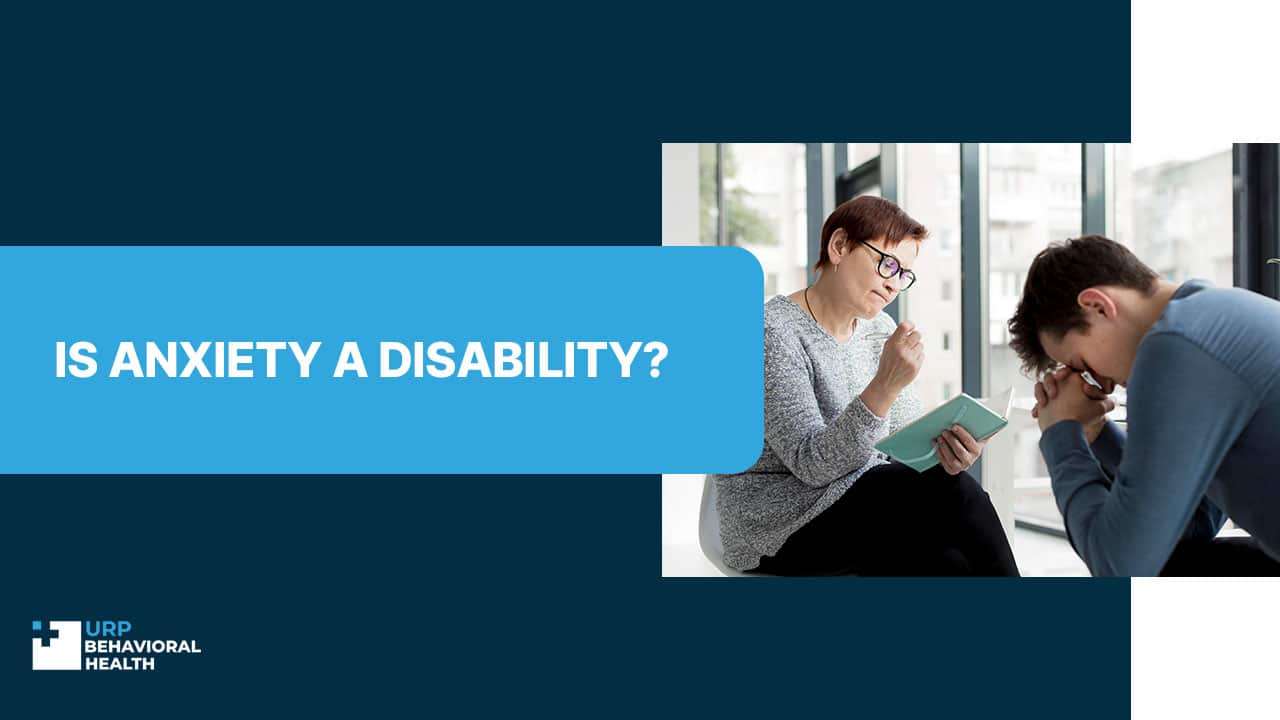
Is Anxiety a Disability?
Feeling anxious is quite normal for everyone. Anxiety is one of the states of mind occurring in critical moments and is bonded to feelings of fear, uneasiness, and dread. Yet, if we are anxious from time to time in situations related to some risks, discomfort, or threats, if anxiety occurs regularly and is accompanied by severe physical and mental symptoms, it can seriously impact our everyday lives. Some may be concerned about if anxiety is a disability. This question is not simple, that’s why this article is dedicated to deciding whether an anxiety disorder is a disability, and how can a person claim it disability to get help and support from the healthcare organization and the SSA.
Does Anxiety Qualify You For Disability? – Overall Information of What Is Anxiety
What is anxiety, first? The feeling of anxiety is a short-term condition related to some real or imagined threats. You may feel disturbed and fear something, or you can feel uneasiness and worry about your well-being or the well-being of your loved ones. Physically, anxiety performs in the form of increased blood pressure, rushed heartbeating, feelings of dizziness, shortness of breath, fatigue, or on the contrary, feeling overwhelmed with emotions. Typically, this condition doesn’t last long, and with the mitigation of a triggering factor, it perishes. Yet, if anxiety issues repeat and increase in severity, they can transfer into anxiety disorder, which is a chronic disease which can significantly impair the patient’s life. Stats say, up to 34% of the US residents have anxiety disorder in any form [1].
The most characteristic symptoms of anxiety disorder are as follows:
- social and performance fears
- triggered and sudden panic attacks
- avoidant behavior
- sleep dysfunctions
- difficulties with concentration
- some phobias like agoraphobia, animal phobias, and situational phobias
Contact our admissions team now to begin your path toward a brighter future.
At the same time, anxiety disorder is a generalized term related to a bunch of mental states sharing similar symptoms. This bunch includes:
- Generalized anxiety disorder
- Panic disorders
- Phobias
- Obsessive-Compulsive Disorder
- Social anxiety disorder
All of them today are categorized by the Social Security Administration as the reasons to claim a disability for anxiety.
The causes of anxiety disorder also vary dramatically. They include both social and environmental factors which contribute to the development and severity of anxiety disorder. They include:
- Childhood trauma and caregiver’s neglect during the childhood
- Dramatic or negative life situations (like being fired or unemployed, death of a partner or a family member, considerable material/financial losses, divorce, domestic abuse issues, etc)
- Constant or severe stresses related to work or education
- Social isolation due to various reasons (staying lonely for a long time, having no friends, being boycotted by the community)
- Social pressure and improper social expectations factors (for being of a peculiar race, being LGBTQ+, being of a certain social status)
All these factors can lead to the development and manifestation of anxiety disorder. At the same time, in such patients, disability and anxiety are correlated as anxiety symptoms often make a patient disabled and excluded from normal functioning.
What Level of Anxiety Can Qualify You For Disability?
If you ask, can I get disability for anxiety, the first thing you should understand is that you have to be officially diagnosed with one of the anxiety disorders [2]. This can be either a generalized anxiety disorder, a panic disorder, or agoraphobia. At once, the severity and persistence of anxiety disorder must be medically documented for at least 2 years prior to claiming for disability because of anxiety. This documentation should include evidence of the treatment provided for the patient to relieve the symptoms of anxiety including medication treatments, psychological support, and psychotherapy methods.
Reach out today and let us create a treatment plan designed around your needs.
Does Anxiety Qualify For Long-Term Disability?
According to the diversity of levels and manifestations of severity of anxiety disorders, they can provide a patient with both long-term and short-term disability for anxiety.
- If you have issues of anxiety which impair your social life and the ability to work, but can be predicted and mitigated by your therapist, you can claim short-term disability to stay protected by the government during your disability period.
- In case your anxiety disorder lasts for long periods with extremely severe manifestations and total disability to work and take part in social life, you can get long-term disability status.
In brief, the SSA provides flexible support for persons disabled because of anxiety disorders and the disability payments are provided as long as the disorder doesn’t improve [3]. Yet, regular reviews of the patient’s state are provided by the organization and changes in payments may be provided if:
- The person returns the ability to work
- The health condition of a patient is improved
The EligibilityRequirements for SSDI WithAnxiety
Being disabled due to anxiety disorders allows a patient to claim SSDI support resulting in payments from the government. You should meet the following requirements to be eligible for SSDI with anxiety [4].
- Being diagnosed with anxiety disorder affecting the ability to work for 2 years or more
- Being unable to earn a certain income due to anxiety disorder’s manifestations
- Being employed for at least 5 of the last 10 years (for people from 24 to 65 years old). Seniors and young adults above 24 years old don’t need to meet this requirement.
Сan YouGet DisabilityFor Anxiety – AGuide For Patients to Claim Disability
So, you clearly understand that anxiety disables you. What should you do to claim your disability for anxiety?
- Check out if you meet the criteria for SSDI listed above.
- Book an appointment in a local SSA office or submit the application via online form on the SSA’s website. While filing the application you need to provide your personal information, Social Security Number, marital and educational statuses, recent employment details, and your bank account details.
- Prepare your medical history with the evidence of the diagnostics of anxiety disorder, names of specialists you applied to, therapy plans you acquired during your treatment, and other medical records as they may be required from you.
- Check if you are qualified for SSDI/SSI. The process is not lightning-fast, so you may need to wait from 6 to 9 months for you to get the first SSDI payment.
Concluding on the Essentials
If you are concerned with the question of whether anxiety is considered a disability, it can be so. Yet, for claiming a person with anxiety issues disabled, the following criteria should match:
- Being officially diagnosed with anxiety disorder of any kind.
- Being treated for anxiety disorder for 2 years or more and providing official documentation for your treatment.
- Meeting the criteria provided by the SSA for disability caused by anxiety.
- Regularly undergoing reviews by the SSA to prove your status as a disabled person.
Anxiety disorders are variable and sometimes, they can be well-treated by the means of professional psychotherapists and medical advisors. You can get help from the URP Behavioral Health Center if you suppose you have an anxiety disorder or if anxiety issues interfere with your life and provide considerable impairments. Do not remain face-to-face with your anxiety, as relevant help is available to you.
Don’t wait - confidential help is available right now for you or your loved one.
Resources:
- https://pubmed.ncbi.nlm.nih.gov/36573969/
- https://www.ssa.gov/disability/professionals/bluebook/12.00-MentalDisorders-Adult.htm
- https://www.ssa.gov/pubs/EN-05-10153.pdf
- https://www.ssa.gov/disability
















